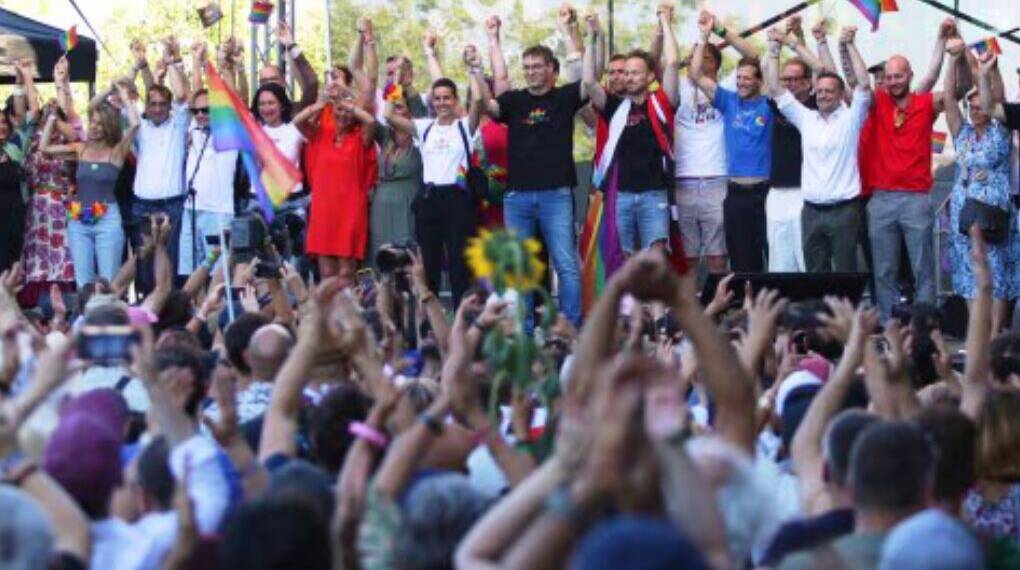A Pride march initially banned by the Hungarian government swelled into one of the most significant anti-government protests in recent years, drawing an estimated 100,000 to 200,000 participants through the streets of Budapest on Saturday. The event, held in defiance of a March 2025 law restricting LGBTQ+ gatherings, quickly transformed from a celebration of identity into a rallying cry against what critics call a deepening crackdown on civil liberties under Prime Minister Viktor Orban’s right-wing government.
A Banned Parade Turns into a Political Statement
Organised by the Budapest municipality and supported by opposition parties and international diplomats, the 30th annual Pride march went ahead despite threats of fines, surveillance, and police repression. What was once a symbolic celebration of LGBTQ+ rights becoming a broader political movement—one that accused Orban’s administration of systematically eroding democratic norms in Hungary.
Participants carried rainbow banners, placards supporting LGBTQ+ rights, and slogans calling for solidarity with European democratic values. Despite a police ban based on the so-called “child protection” law—which restricts gatherings deemed to “promote homosexuality”—marchers proceeded peacefully across key parts of the city, including the Elisabeth Bridge.
“This is about much more than sexuality,” said Eszter Rein Bodi, one of the demonstrators. “This is the last moment to stand up for our rights.”
Government Reaction: Orban’s Accusations and Cultural War
Prime Minister Orban condemned the Pride event as “repulsive and shameful,” accusing the European Union of directing opposition politicians to use the march as an anti-government demonstration. Speaking in a private online group, “Fight Club,” Orban suggested Brussels orchestrated the mobilization against his leadership, though he provided no evidence.
Orban’s remarks were particularly focused on the presence of drag performers, men in high heels, and information on gender-affirming therapies. His criticism reflects his government’s decade-long cultural offensive against LGBTQ+ rights, framed as part of a broader campaign to “protect children” and “defend traditional Christian values.”
This year’s law banning Pride events also empowers authorities to use facial recognition surveillance and imposes fines up to €500 for attendees, with organizers facing up to one year in prison—a signal of the government’s readiness to criminalize public dissent.
Tensions with the European Union
The Budapest Pride march became a flashpoint in the ongoing standoff between Hungary and the EU over democratic backsliding and human rights. European Commission President Ursula von der Leyen had urged Hungary to permit the event, calling it a matter of basic freedoms. Orban fired back, comparing her remarks to “receiving orders from Moscow,” evoking Cold War-era resentment of foreign control.
Meanwhile, Belgian Equalities Commissioner Hadja Lahbib and other EU officials joined the demonstration, reinforcing international support for Hungary’s civil society. “European values are rooted in respect, solidarity, and freedom for all,” the Belgian embassy in Budapest posted on X.
Orban’s government has increasingly portrayed opposition mayors like Gergely Karacsony of Budapest as “puppets of Brussels,” aiming to sway public opinion ahead of national elections in 2026.
A Civil Society on the Edge
While Orban insisted Hungary is a “civilised society” and dismissed the risk of police violence, his government’s legal apparatus continues to threaten organisers and protesters. The state’s ability to identify participants using facial recognition and impose criminal charges signals a growing surveillance state in a nominal EU democracy.
Critics, including human rights groups and opposition leaders, argue that the government is stifling freedom of assembly, freedom of expression, and minority rights under the guise of child protection. They warn this is part of a broader authoritarian tilt in Hungary, as Orban enters his 16th year in power.
What Comes Next?
The scale and defiance of Saturday’s march could reshape the political landscape ahead of the 2026 elections. The event also highlights deepening fractures between Hungary and the European Union, especially on issues of democratic governance and human rights.
For many in Hungary’s LGBTQ+ community and their allies, the risks they took on June 28 were not just about Pride—they were about the future of freedom in the country.








